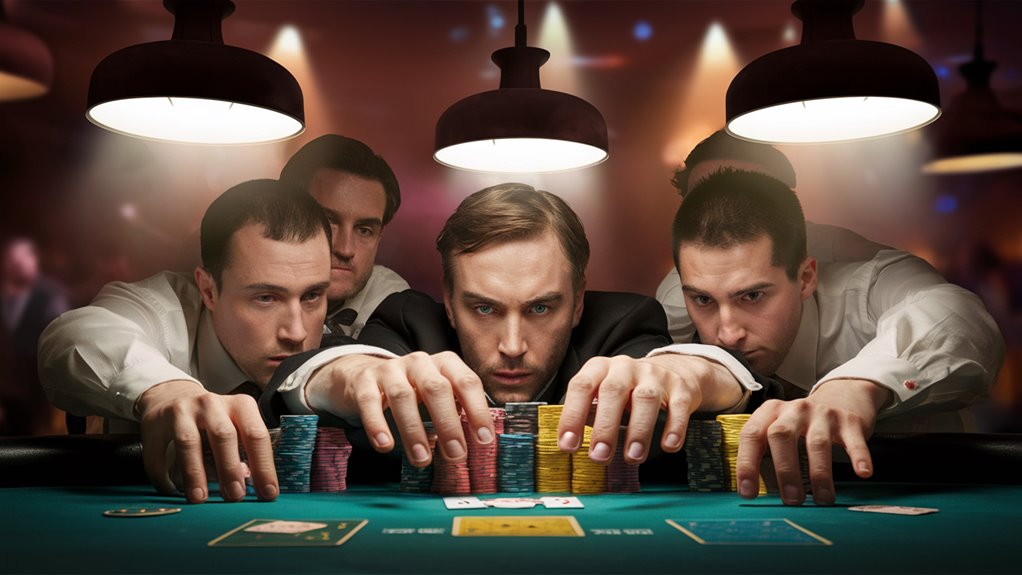
Why Are Players Drawn to Skill-Based Casino Games?
Key Takeaways
- Skill-based casino games combine strategy and chance for enhanced player control
- Games like poker and blackjack offer measurable improvement through practice
- Players report higher satisfaction when outcomes depend on their decisions
- Strategic thinking and psychological elements create deeper engagement
The Appeal of Strategic Gaming
Skill-based casino games attract players by combining decision-making with gambling mechanics. Unlike pure chance games, options like poker and blackjack enable players to influence outcomes through strategic choices, mathematical calculations, and psychological insights.
Psychological Rewards
Players experience heightened engagement when their decisions impact results. The process of:
- Learning optimal strategies
- Reading opponents
- Calculating probabilities
- Making tactical adjustments
creates a more intellectually stimulating experience than games of pure chance.
Measurable Improvement
Skill-based games offer concrete ways to track progress:
- Win rates over time
- Strategy refinement
- Bankroll management
- Pattern recognition abilities
Social Dynamics
These games often incorporate player interaction, creating:
- Competitive environments
- Community building
- Status recognition
- Networking opportunities
Long-Term Engagement
Strategic elements keep players invested through:
- Continuous learning curves
- Achievement milestones
- Evolving meta-strategies
- Tournament opportunities
This combination of skill development and gambling mechanics creates a compelling entertainment format that maintains player interest beyond single sessions.
The Psychology Behind Strategic Gaming
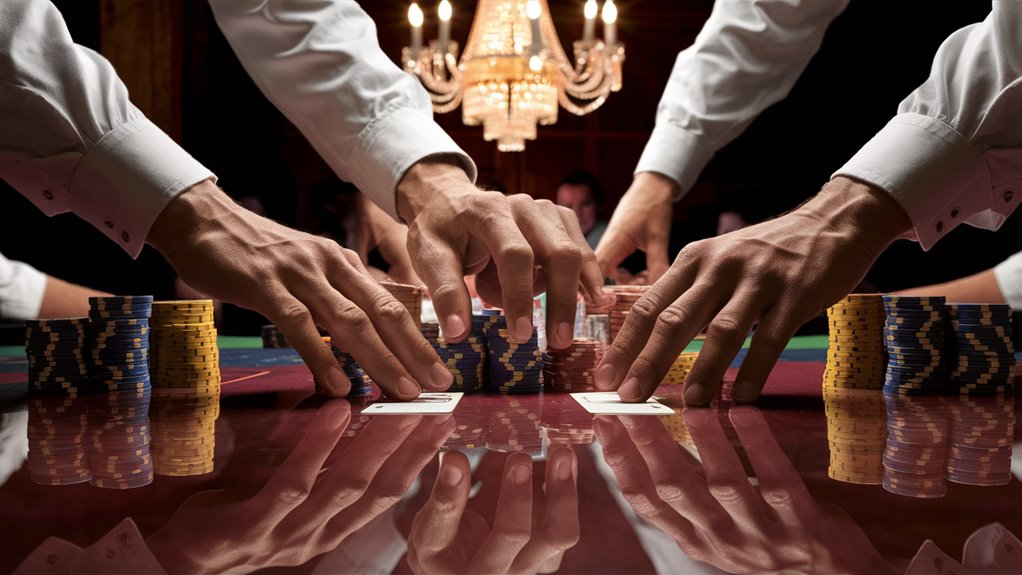
How Does Psychology Impact Strategic Gaming Decision-Making?
Key Takeaways:
- Strategic gaming activates reward centers through dopamine release
- Skill-based games create a stronger illusion of control than chance-based games
- The Dunning-Kruger effect influences player confidence and behavior
- Understanding probability enhances player engagement and satisfaction
The Neuroscience of Strategic Gaming
Strategic casino gaming taps into fundamental psychological mechanisms of decision-making and reward.
During skill-based games like poker and blackjack, the brain releases dopamine when players make calculated decisions, creating a reward sensation intensified by skill-based outcomes rather than pure chance.
The Illusion of Control in Gaming
Strategic games create a more pronounced sense of control compared to games of pure chance.
Players who understand probability and game theory experience heightened engagement and satisfaction, treating each game as a complex puzzle requiring real-time solutions.
Cognitive Biases and Player Behavior
The Dunning-Kruger effect significantly influences strategic gaming psychology, leading players to overestimate their abilities.
This cognitive bias, combined with intermittent wins, creates a powerful psychological engagement loop that drives players to:
- Study optimal strategies
- Analyze probability and odds
- Refine gaming techniques
- Pursue the perfect balance of skill and luck
Player Engagement and Skill Development
Strategic gamers often demonstrate high levels of dedication to improving their abilities through:
- Mathematical analysis of game scenarios
- Pattern recognition development
- Risk management strategy refinement
- Psychological opponent reading techniques
This continuous pursuit of mastery reinforces the psychological rewards of strategic gaming while deepening player engagement with the complex decision-making processes involved.
Popular Types of Skill Games
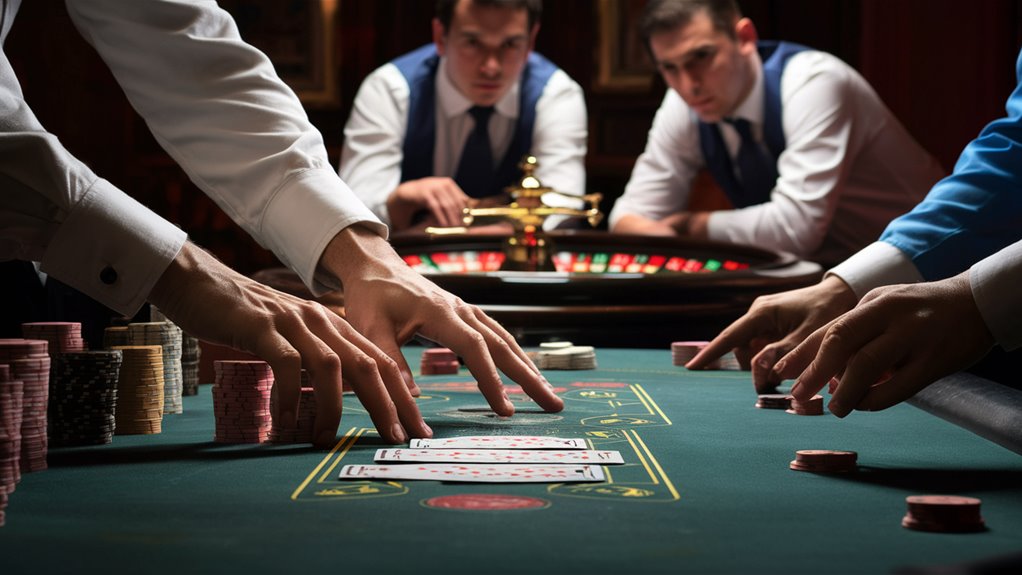
What Are the Most Popular Types of Skill Games in Casinos?
Key Takeaways
- Poker and blackjack remain the leading strategic casino games
- Video poker and skill-based slots combine traditional gaming with player ability
- Tournament formats offer competitive skill-based gameplay
- Sports betting requires extensive knowledge and analytical skills
Traditional Card-Based Skill Games
Poker and blackjack dominate the casino floor as premier skill-based games.
Texas Hold’em and Omaha poker variants require players to master complex decision-making, psychological warfare, and probability calculations.
Blackjack attracts strategic players through basic strategy implementation, though casinos actively monitor for advanced techniques like card counting.
Electronic Skill Gaming
Video poker machines merge traditional poker knowledge with rapid decision-making requirements.
Players must understand hand rankings and develop optimal holding strategies for success.
Modern skill-based slot machines feature arcade-style bonus rounds where gaming proficiency directly impacts potential winnings.
Tournament-Style Competition
Digital casinos increasingly offer tournament formats for skill games.
Competitive backgammon and mahjong allow players to challenge other participants rather than competing against the house.
Electronic table games incorporate skill elements through multiplayer tournaments and progressive difficulty levels.
Sports Betting Strategy
Sports wagering success demands comprehensive knowledge of:
- Team statistics and performance metrics
- Market dynamics and odds movement
- Historical data analysis
- Player injury impacts
- Weather conditions affecting outcomes
This combination of required expertise makes sports betting a legitimate skill-based activity within the gambling industry.
Strategy Versus Pure Chance
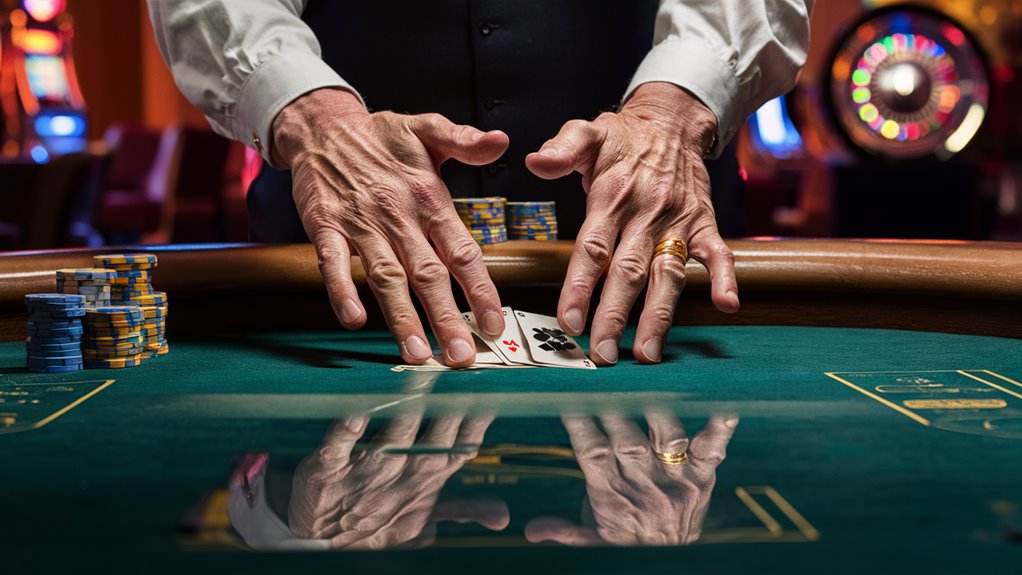
What’s the Real Difference Between Skill and Chance in Casino Games?
Key Takeaways
- Strategy-based games like poker and blackjack allow players to influence outcomes through decision-making
- Pure chance games like slots and roulette operate solely on random number generators
- Understanding this distinction helps players make informed choices about which games to play
- Skill games offer better long-term winning potential with proper strategy
Strategy-Based Games vs. Pure Chance
Casino gaming success hinges on understanding the fundamental difference between strategy and pure chance at the tables.
Strategy-based games empower players with meaningful choices 카지노사이트 while chance-based games rely entirely on luck.
How Strategy Games Work
Strategy-based games like poker and blackjack provide opportunities for calculated decision-making that directly impacts winning potential.
In poker, players analyze opponents’ behaviors, manage bankroll effectively, and make strategic hold-or-fold decisions.
Blackjack players can implement basic strategy charts and card counting techniques to minimize the house edge.
Pure Chance Games Explained
Games like slots and roulette operate purely on chance, with no room for strategic input.
The outcome of each slot machine spin or roulette ball drop depends entirely on random number generators or physical randomness.
No betting system or strategy can influence these predetermined results.
Making Smart Gaming Choices
For players seeking to maximize their winning potential, focusing on skill-based games offers the best opportunity for success.
While luck plays a role in all casino games, only strategy games allow players to improve their odds through skillful decision-making and proper technique application.
Impact on Long-Term Results
- Strategy games: Players can reduce house edge through skilled play
- Pure chance games: House edge remains fixed regardless of player actions
- Bankroll management: More effective in strategy-based games
- Learning curve: Investment in skill development can lead to better outcomes
Learning Curves and Player Development
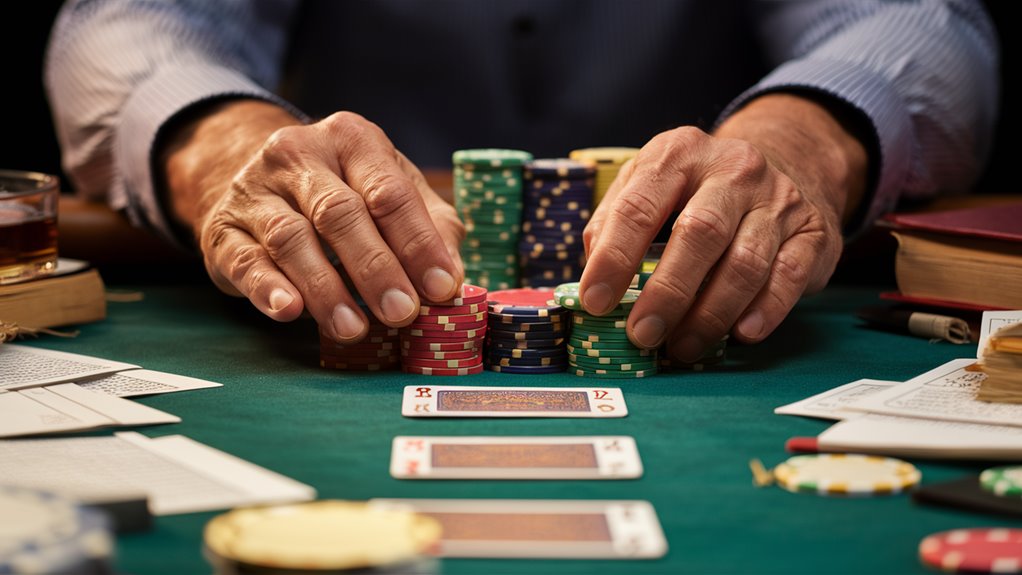
How Do Players Develop Skills in Casino Strategy Games?
Key Takeaways
- Player development follows distinct stages from basic rules to advanced strategy
- Progress occurs in cycles of breakthroughs and skill plateaus
- Skill-based games offer continuous learning opportunities unlike chance-based games
Understanding the Learning Curve
Casino strategy games require systematic skill development through focused practice and study.
Players typically advance through clear developmental stages, beginning with fundamental rule comprehension and progressing to sophisticated strategic analysis.
This structured learning path creates measurable achievements that drive continued engagement.
Breaking Through Skill Plateaus
Learning games like blackjack and poker involves non-linear progression patterns.
Players experience breakthrough moments followed by consolidation periods where new concepts must be integrated into their gameplay.
Those who embrace this cycle often develop deeper insights into both mathematical principles and psychological aspects of the game.
The Competitive Edge of Skill-Based Games
The development trajectory in casino strategy games parallels competitive sports and chess, offering unlimited potential for improvement.
Players commonly start with basic strategy charts before advancing to complex probability calculations and opponent behavior analysis.
This continuous growth potential distinguishes skill-based games from pure chance options like slots or roulette, making them particularly attractive to serious players.
Practical Steps for Skill Development
- Master basic rules and terminology
- Study fundamental strategy charts
- Practice probability calculations
- Develop psychological reading skills
- Apply advanced tactics in live play
- Review and analyze performance regularly
Social Aspects of Competitive Play
How Do Social Dynamics Shape Competitive Casino Gaming?
Key Takeaways
- Social interactions enhance skill development in casino strategy games
- Community engagement occurs through study groups, forums, and in-person gameplay
- Competitive elements create both rivalry and camaraderie among players
- Shared learning experiences accelerate player development
The Social Foundation of Casino Gaming
Casino strategy games create natural communities where players connect through shared experiences and competitive spirit.
Whether at poker tables or blackjack tournaments, players naturally form bonds with others who share their passion for strategic gaming.
Community Learning and Development
Social connections in casino gaming manifest through multiple channels:
- Study groups for analyzing gameplay techniques
- Online forums dedicated to strategy discussions
- Regular player meetups at local casinos
- Tournament communities
- Strategy sharing sessions
Competition Meets Collaboration
The competitive environment in casino gaming creates a unique dynamic where players:
- Learn from opponents’ successful techniques
- Share insights after challenging matches
- Build mutual respect through skilled play
- Exchange strategies to improve collective knowledge
Building Lasting Connections
These social interactions transform casino gaming from an individual pursuit into a community experience.
Players develop their skills faster through:
- Peer feedback and criticism
- Shared experience analysis
- Collaborative problem-solving
- Regular competition against skilled opponents
The combination of competition and camaraderie creates an environment where players continuously improve while building meaningful relationships within the gaming community.
Risk Management and Decision Making

How Can Risk Management Improve Decision Making in Strategic Games?
Key Takeaways
- Risk assessment and bankroll management are fundamental to successful strategic gameplay
- Expert players simultaneously evaluate multiple variables for optimal decision-making
- Skills learned through strategic gaming transfer to real-world financial management
- Emotional control and disciplined thinking are essential for long-term success
Understanding Risk Assessment in Strategic Games
Risk management in strategic games requires continuous evaluation of position and resources.
Players must weigh potential rewards against possible losses while monitoring their bankroll, understanding game-specific probabilities, and recognizing optimal moments for action.
Expert Decision-Making Process
Advanced players develop the ability to process multiple variables simultaneously:
- Hand strength evaluation
- Mathematical probability calculations
- Position assessment
- Opponent behavior analysis
- Risk-reward ratio computation
Real-World Applications
The skills developed through strategic gaming directly translate to practical applications:
- Financial Management
- Portfolio risk assessment
- Investment decision-making
- Resource allocation
- Emotional Control
- Maintaining composure under pressure
- Avoiding impulsive decisions
- Managing stress during volatility
- Strategic Planning
- Long-term goal setting
- Adaptation to changing conditions
- Pattern recognition
Developing Transferable Skills
Regular engagement in strategic games builds crucial abilities:
- Probability assessment
- Resource management
- Pattern recognition
- Strategic thinking
- Emotional regulation
- Disciplined decision-making
These skills prove valuable across various professional and personal scenarios, making strategic gaming an effective training ground for real-world decision-making.